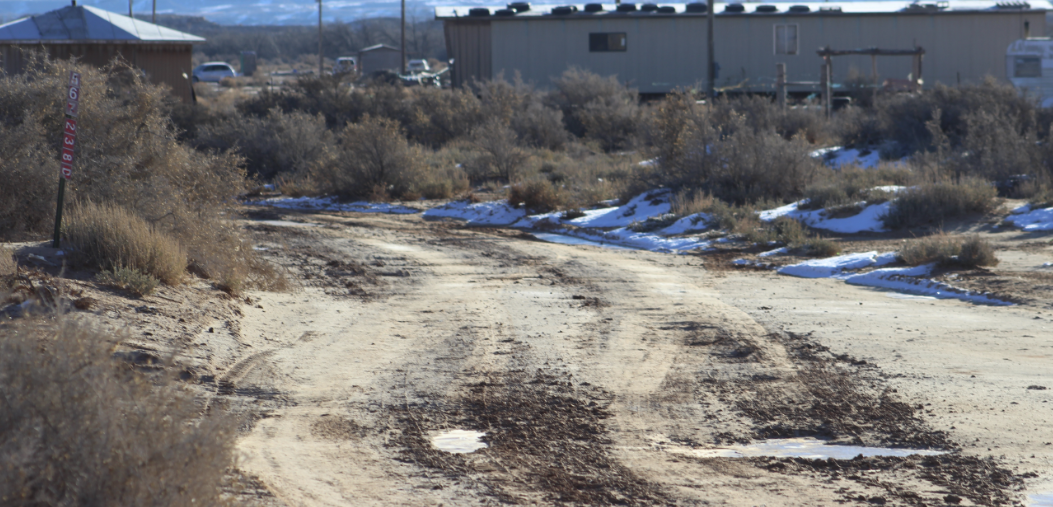
- Details
- By Native News Online Staff
Through the settlement, the Nation will affirm and quantify its enforceable rights to water in Arizona and secure funding to build much needed water delivery infrastructure that will provide long overdue access to water to tens of thousands of homes in Arizona Navajo communities.
Legislation to approve the Northeastern Arizona Indian Water Rights Settlement Agreement was introduced to the Navajo Nation Council late Monday, May 12 by Speaker Crystalyne Curley and co-sponsored by Delegate Germaine Simonson who represents Navajo communities impacted by coal mining.
Speaker Curley said the settlement serves as a cornerstone to providing essential water infrastructure that is crucial to Navajo families and communities.
“The lack of accessible water sources has unfortunately led to the displacement of many Navajo community members, compelling them to relocate themselves closer to these vital resources and related opportunities," Speaker Curley said in a statement. "With the introduction of this settlement, we anticipate a profound impact on Navajo investments in essential infrastructure projects, such as roads, housing, education, and healthcare, all of which require water. This will not only foster growth, health, and prosperity within our nation but also ensure a sustainable future for generations to come."
The 17 parties to the settlement include the United States (U.S.), the State of Arizona, and the Hopi and San Juan Southern Paiute tribes. The settlement calls for the Navajo Nation to receive a substantial amount of Arizona’s allocation of Colorado River Upper Basin water, some Lower Basin water, all groundwater underlying the Navajo Nation, and all surface water that reaches the Navajo reservation from the Little Colorado River. Wash water and Navajo Aquifer water will be governed by an intertribal management plan.
Navajo Nation Attorney General Ethel Branch said the proposed settlement agreement offers the Nation an opportunity to ensure that water will continue to be available to protect the Navajo people and sustain life on Navajo lands 100 years into the future.
“If authorized and funded by Congress, this settlement will provide billions of dollars’ worth of water infrastructure and development for Navajo communities in Arizona. Our Navajo communities have endured great hardship for decades due to severe water infrastructure deficiencies that have negatively impacted our peoples’ health, longevity, financial wellbeingand general welfare” Attorney General Branch said. “The settlement offers the Navajo Nation an opportunity for growth and economic prosperity, and a pathway home for our children, our grandchildren and generations yet to come,”
The settlement authorizes the Navajo Nation to divert Arizona water in Utah and New Mexico for delivery to Navajo communities in Arizona. It also gives the Nation the ability to move water across the upper and lower basins to provide Arizona Navajo community residents with access to Colorado River surface water.
Navajo Nation President Buu Nygren said after waiting since the 1960s to achieve access to water along its border, this settlement “is a monumental step to ensure the Navajo Nation can provide water to our people.”
“Securing this settlement, delivering water to our homes, is not just a promise, it’s my priority,” he said. “This agreement brings us closer to making that a reality for every Navajo family. This water is needed to build roads, schools, clinics, businesses, housing andall kinds of economic development across our Nation to secure our future.”
Shortly after the Navajo Nation Council approves the legislation and President Nygren signs it, federal legislation is expected to be introduced in Congress. Funding from the settlement, once authorized by Congress, will provide much needed water delivery infrastructure to Navajo families in Arizona who have never had access to piped water.
Projects in the settlement include the iiná bá–paa tuwaqat’si pipeline (formerly known as the Western Navajo Pipeline), the Four Corners Project, the Southwest Regional Groundwater Project, the Ganado Regional Groundwater Project, the Black Mesa Regional Groundwater Project, the Lupton Area Project, the Kayenta Aquifer Storage and Recovery Project and the Code Talker Lateral Extension.
“The Navajo Nation is committed to safeguarding a permanent homeland for the Diné and preserving the Navajo way of life,” said Navajo Nation Water Rights Commissioner Chair Joelynn Ashley. “This settlement helps close the severe equity gap all across our Navajo communities. It will ensure that our Navajo families will have equal access to water in their homes.”
Next week, three Navajo Nation Council committees will review the legislation before a special session of Councilis called to vote on it. A two-thirds vote is needed for passage. Public comments can be sent to [email protected].
More Stories Like This
Gwich'in Tribal Governments Submit Comments Challenging Fish and Wildlife Service's Inadequate Environmental Review of Arctic Refuge Snow RoadRappahannock Tribe Challenges 9M-Gallon Water Plan
Feds release draft long-term plans for Colorado River management
Apache Leader Walks 60 Miles to Court Hearing That Will Decide Fate of Sacred Oak Flat
Rappahannock Tribe Raises Sovereignty and Environmental Concerns Over Caroline County Water Permit
Help us defend tribal sovereignty.
At Native News Online, our mission is rooted in telling the stories that strengthen sovereignty and uplift Indigenous voices — not just at year’s end, but every single day.
Because of your generosity last year, we were able to keep our reporters on the ground in tribal communities, at national gatherings and in the halls of Congress — covering the issues that matter most to Indian Country: sovereignty, culture, education, health and economic opportunity.
That support sustained us through a tough year in 2025. Now, as we look to the year ahead, we need your help right now to ensure warrior journalism remains strong — reporting that defends tribal sovereignty, amplifies Native truth, and holds power accountable.
 The stakes couldn't be higher. Your support keeps Native voices heard, Native stories told and Native sovereignty defended.
The stakes couldn't be higher. Your support keeps Native voices heard, Native stories told and Native sovereignty defended.
Stand with Warrior Journalism today.
Levi Rickert (Potawatomi), Editor & Publisher


